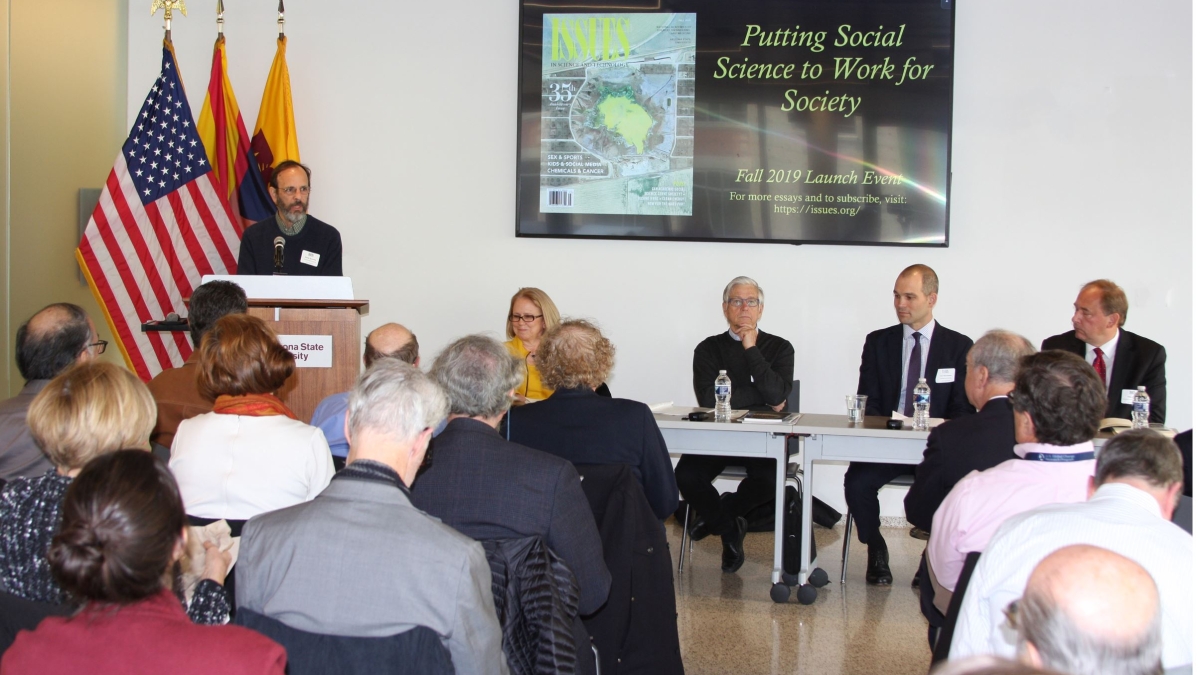ASU launches quarterly journal: Issues in Science and Technology

Daniel Sarewitz (at lectern), editor-in-chief of Issues in Science and Technology, introduces moderator Mary Ellen O’Connell (second from left), executive director of the Division of Behavioral and Social Sciences and Education at the National Academies of Sciences, Engineering, and Medicine; and panelists Kenneth Prewitt (middle), Carnegie Professor of Public Affairs and special adviser to the president at Columbia University; Jed Herrmann (second from right), vice president of state and policy implementation at Results for America; and Toby Smith (right), vice president for policy at the Association of American Universities, at an event on applying social science research to real-world issues at ASU in Washington, D.C.
In a world facing many complex, formidable problems, how can the social sciences become a decisive force for improving social conditions? And what role can universities play in transforming the social sciences into drivers of societal improvement? These are the questions panelists explored at the fall 2019 "Issues in Science and Technology" launch event on Nov. 20 at Arizona State University’s Barrett and O’Connor Center in Washington, D.C.
Issues is a quarterly journal that discusses public policy related to science and technology, published by ASU in collaboration with the National Academies of Sciences, Engineering, and Medicine. “Retrofitting Social Science for the Practical and Moral” — the featured article of the fall 2019 issue — by Kenneth Prewitt, a professor at Columbia University and former director of the U.S. Census Bureau, explores how the social sciences gradually retreated from being concerned with practical application — and how social scientists might return the discipline to engaging with pressing social concerns. He also challenges social scientists to improve how they talk about the broader value of their work.
“If social science expects public funds, we cannot just assert our contribution; we will learn to be responsive to what the receiving end expects our contribution to be,” Prewitt said. “Such responsiveness does not imply ‘applied research.’ It does mean, however, that research priorities will often be externally generated. To deal with this fact requires fresh thinking, certainly keeping what worked in the past but also adding and adjusting to what is expected in the present.”
Mary Ellen O’Connell, executive director of the Division of Behavioral and Social Sciences and Education at the National Academies of Sciences, Engineering, and Medicine, moderated the panel discussion of Prewitt’s article. Panelists included Toby Smith, vice president for policy at the Association of American Universities, and Jed Herrmann, vice president for state and federal policy implementation at Results for America.
“This article struggles with a question that should be an easy one to answer, but isn’t,” said O’Connell. “That is: ‘What story best captures and communicates the social science contribution to society in the 21st century?’”
Panelists suggested that social scientists should begin by listening to the communities affected by their research. “Social scientists should engage with communities as they do their research, go out into communities and find out what problems need to be solved, and attempt to solve those, rather than assuming they know what those problems are,” said Smith, who cited ASU as a model university for this type of community engagement.
“I hear all the time from people in state and local governments who are interested in partnering with academia to evaluate their programs and learn about the latest social science research,” said Herrmann. “But too often they have academics who come to them with their paper or book in hand and say, ‘I want to apply this in your city and your state.’ A collaborative, problem-defining approach is a necessary step forward for academics to have more engagement with state and local governments and nonprofits.”
Prewitt challenged the field to be self-reflective about how to return the discipline to being relevant to everyday life. “We all know we’ve got a problem. I worry that the story we’re telling is too much the ‘usefulness of useless knowledge’ and the ‘evidence-based policy’ story,” said Prewitt. “That is my big argument in this article. It’s not enough to tell the story we’ve got to tell and have been telling. We need something new.”

